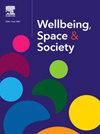不同社会生态水平下社会环境因素对学生心理健康的直接和间接影响:纵向视角
IF 2.2
Q2 GEOGRAPHY
引用次数: 0
摘要
学生的心理健康受到社会环境条件的影响,但很少有研究调查不同水平的社会环境如何随着时间的推移相互作用,以支持或阻碍心理健康。本研究从社会生态学的角度探讨了中观因素(社会凝聚力、社区整合和社区组织)如何通过微观层面的关系体验(社会支持和社会网络满意度)直接或间接地与学生心理健康相关。此外,个人层面的看法(互惠和社会信任)在塑造这些社会条件的作用进行了审查。数据通过两波纵向调查(T1时N = 384; T2时N = 207)在荷兰一所应用科学大学的全日制学生中收集。横截面和纵向回归分析,以及使用PROCESS的平行中介模型。结果表明,中观因素通过微观机制直接或间接地影响心理健康,尤其是通过社会网络满意度。尽管T1比T2的效果更强,但研究结果强调了多层次社会背景在理解学生幸福感方面的重要性。个体层面的互惠和社会信任感知与学生对所有社会环境因素的微观和中观感知相关。这些发现强调了在教育环境中凝聚力和支持性社会环境的重要性。中观层面的干预措施,如增强社会凝聚力和支持社区组织,可能为学生的心理健康提供直接和间接的好处。本文章由计算机程序翻译,如有差异,请以英文原文为准。
The direct and indirect effects of social environmental factors on student mental wellbeing at different socio-ecological levels: A longitudinal perspective
Student mental wellbeing is shaped by social environmental conditions, yet few studies have examined how different levels of the social environment interact to support or hinder mental wellbeing over time. This study applies a socio-ecological perspective to explore how meso-level factors (social cohesion, community integration, and community organizations) are directly and indirectly associated with student mental wellbeing through micro-level relational experiences (social support and social network satisfaction). In addition, the role of individual-level perceptions (reciprocity and social trust) in shaping these social conditions is examined. Data were collected through a two-wave longitudinal survey (N = 384 at T1; N = 207 at T2) among full-time students at a Dutch university of applied sciences. Cross-sectional and longitudinal regression analyses were conducted, alongside parallel mediation models using PROCESS. Results show that meso-level factors are associated with mental wellbeing both directly and indirectly via micro-level mechanisms, particularly through social network satisfaction. Although effects were stronger at T1 than at T2, the findings underscore the importance of multi-level social contexts in understanding student wellbeing. Individual-level perceptions of reciprocity and social trust were associated with students’ perceptions of all social environmental factors at the micro- and meso-level. These findings underscore the importance of cohesive and supportive social environments within educational settings. Interventions at the meso-level—such as enhancing social cohesion and supporting community organizations—may offer both direct and indirect benefits for student mental wellbeing.
求助全文
通过发布文献求助,成功后即可免费获取论文全文。
去求助
来源期刊

Wellbeing Space and Society
Social Sciences-Social Sciences (miscellaneous)
CiteScore
2.70
自引率
0.00%
发文量
46
审稿时长
124 days
 求助内容:
求助内容: 应助结果提醒方式:
应助结果提醒方式:


